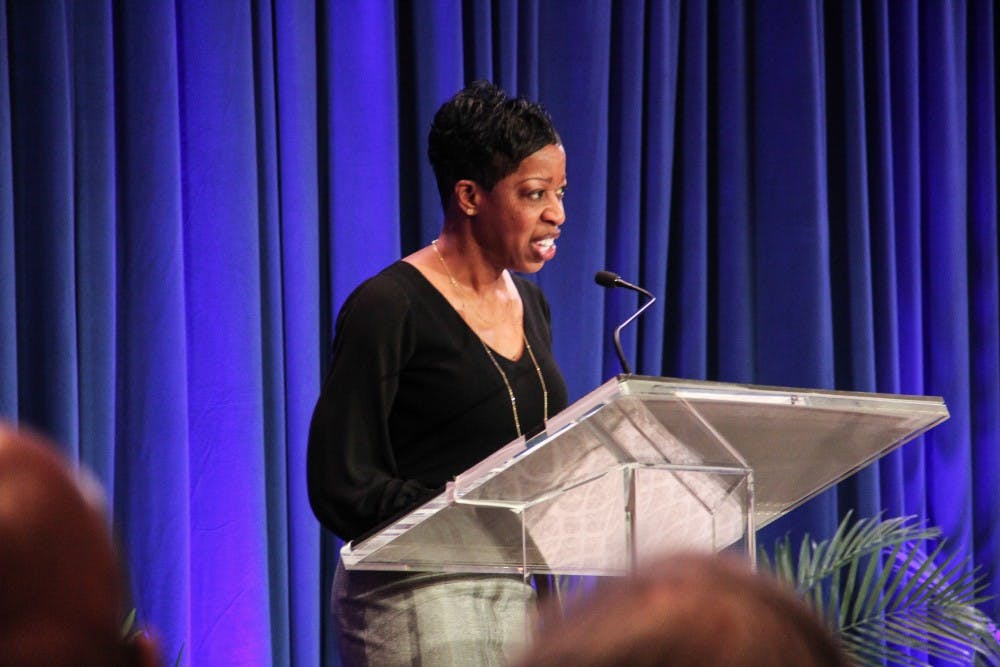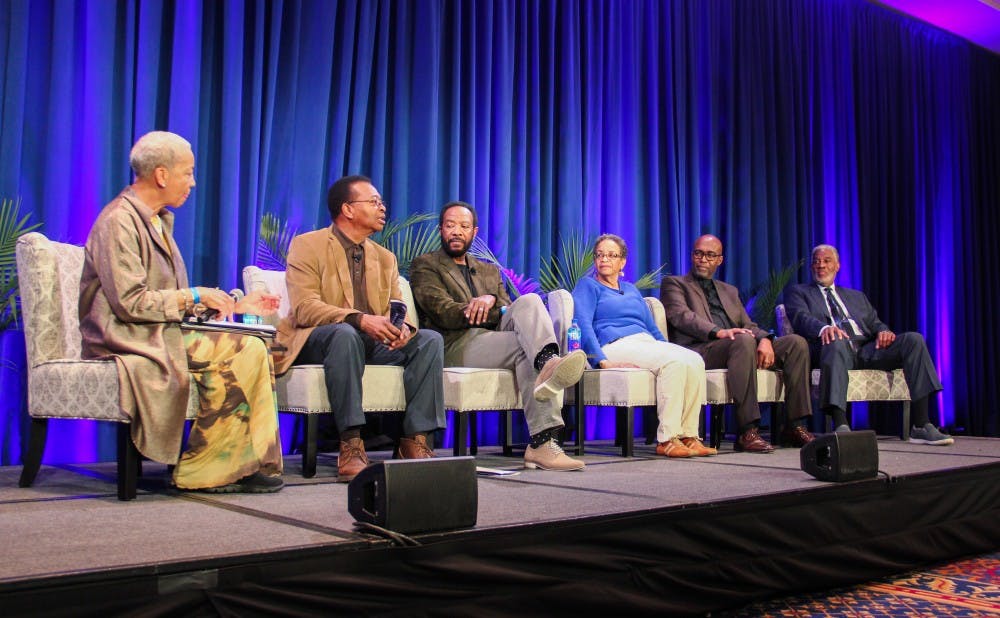Students who took over the Allen Building in 1969 shared their memories of the takeover at an official commemoration Saturday afternoon.
As part of the official events held Feb. 12 at the Washington Duke Inn and the Nasher Museum, student protesters from the Allen Building Takeover discussed their memories and the legacy it has left on Duke's campus.
The Allen Building Takeover, which took place on Feb. 13, 1969, helped lead to the creation of the African American Studies program at Duke and brought attention to the needs of African-American students at Duke.
The panel discussing the Allen Building Takeover was led by Catherine LeBlanc, Woman's College '71.
The other members of the panel were Charles Hopkins, Trinity '69, Michael LeBlanc, Trinity '71, Michael McBride, Trinity '71, Charles Becton, Law School '69, and Janice Williams, Woman's College '72.
At the commemoration, the panelists mentioned that members of the Duke administration acknowledged the Allen Building Takeover's influence on the University.
Valerie Ashby, dean of the Trinity College of Arts and Sciences, and Mark Anthony Neal, chair of the department of African and African American Studies at Duke, acknowledged the pivotal role of the Takeover in influencing student activism at Duke in the five decades afterward. Senior Qsanet Tekie joined them as speakers at the commemoration.
Both Ashby and Neal also cautioned that the lessons of the Allen Building Takeover show that Duke still has much progress to make.
"Duke is not what it once was, but it certainly is not where it needs to be. We can thank those brave souls 50 years ago for always making it clear, making that clear to us," Neal said.
Campus and local atmospheres contributed to the takeover
The panelists also touched on their initial reactions and the injustices that existed when they arrived on campus.
"I began to quickly learn what those disparities were and what those injustices were, and was eager to learn how to fight against them," Williams said.
Other panelists mentioned that African-American students at Duke at the time were kept apart by the Duke administration.
"Duke thought that the best way to bring us here was to keep us isolated, keep black students isolated from each other, so in all of our classes we were the only one," Hopkins said.
Hopkins, a talented writer when he got to Duke, also recalled the extreme difficulty that African-American students had getting professors to acknowledge the quality of their work. One professor even accused Hopkins of having his roommate, a white student, write his essays.
"Not everyone at Duke agreed that black people were smart enough to be at Duke," Hopkins said.
Along with conditions on campus, the national and local atmosphere in 1969 also played a role in creating the conditions for the Allen Building Takeover. The original protesters mentioned both national tensions and civil rights-focused college protests around the country, including a five-month strike at San Francisco State University in California.
The strength and organization of the Durham community also helped support the African-American students at Duke and draw attention to their cause.
"Durham was unique in the United States at that time in terms of having one of the most conscious and organized black communities," Hopkins said. "We immediately had older people that we could lean on and learn from who were interested and supportive of what we were doing."
Perhaps more than any other factor, the panelists argued that student unity—particularly among the African-American students at Duke—was the driving force behind the Allen Building Takeover.
"It was hard to find a black individual at that time who criticized the things that we were trying to do," Hopkins said.

The Takeover
Members of the panel agreed that the Allen Building Takeover was the culmination of poor conditions for African-American students on campus and years of inaction by the Duke administration.
"This was like water boiling. It just got hotter and hotter and hotter," Michael LeBlanc said.
Hopkins, the leader of the Allen Building Takeover, said that it was initially difficult to convince students to commit to the action despite the conditions on campus.
"The turning point for me as an organizer of the thing was when grades came out. I had people coming to me, people who had never participated in any kind of Afro-American Society activity, black students who had never spoken to me, who said Chuck we need to do something," Hopkins said.
C.B. Claiborne, Pratt '69 and the first African-American basketball player at Duke, spoke about his reasons for joining the students in the Allen Building.
"When I'm asked why did you come into the Allen Building, it was because my community was here, among the black students," Claiborne said.
The panel also discussed the role of Black Culture Week, which ran from Feb. 4 to Feb. 12, 1969, in driving the Allen Building Takeover. Williams explained that the week helped convince members of the Allen Building Takeover that the group's demands were necessary.

'We're in here now, and these are our demands'
Once plans for the Allen Building Takeover were in place, details still had to be resolved. The original protesters recalled that they briefly considered whether to bring weapons into the Allen Building for self-defense before deciding against it.
"Our thing was don't give the administration an excuse not to focus on the issues that we're trying to raise," Hopkins said.
The protesters were careful to make their demands clear and communicate quickly with the administration.
"I got on the phone, called [Bill Griffith, dean of student affairs] and said 'Dean Griffith, we're members of the Afro-American Society, we've just taken over the administration building, we're in here now and these are our demands,'" Hopkins said.
Although negotiations took place of the course of the day of the Allen Building Takeover, the administration refused to negotiate until the students had left the building. The University issued a series of ultimatums before the student protesters received word that police were organizing in Duke Gardens to force the protesters out of the Allen Building.
"On the next vote [on whether to stay or leave] I was counting and the vote was 13 to stay and 12 to leave, but I reported that as just the opposite," Becton said.
Other panelists suggested that Becton's decision to report the vote as a decision to leave may have saved the students' lives.
"After we took the second vote and Becton so graciously saved our lives we decided to come out of the building. After then, the police was coming in the door that faced Campus Drive as we were coming out of the building facing Perkins Library. Our recollection is that they came in throwing tear gas so we got out just in time," Catherine LeBlanc said.
Get The Chronicle straight to your inbox
Signup for our weekly newsletter. Cancel at any time.

